Beyond the Bike
Solon to Syriza or How to Save Greece
In my first blog on lessons from the financial crisis, I highlighted the importance of history in Economics, looking back to the Great Depression and even further to when China was the world's largest economy. But, as Claire (a Classics teacher) keeps telling me, most of the lessons we need for contemporary society can be obtained by studying the ancient civilisations of Athens and Rome. Thus this is the first, but hopefully not the last, Economic Cycle blog written by her, although she freely admits it has been shamelessly plundered (with his permission) from a truely fantastic lecture by Oxford Classicist Peter Thonemann. I think it is a great read and perhaps Angela Merkel and co should think about some of these ideas...
Only a few years ago most people’s image of Greece would have been beautiful beaches, whitewashed houses, vile drinks and those causing riots were most likely to be drunken Brits. In 2015 Greece summons up a whole new set of images: mass homelessness, teachers and nurses becoming dependent on food-banks, riots, an economic collapse and a social breakdown more rapid and more violent than anywhere else in the western world since WW2.
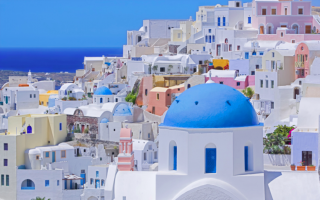
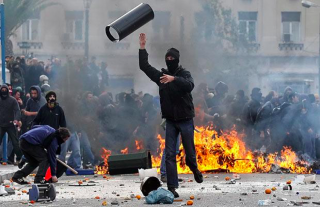

The beautiful Greece and 2015's riots.
The story of Greece’s recent decline is long, complicated and depressing but here it is compressed into a few simple points:
1. In the late 20th and early 21st centuries, European banks lent huge sums of money to the Greece, c. €310 billion. All this money would eventually have to be repaid...
2. In the 1990s and 2000s, Greece spent loads of money. It had a top class educational system, a great health service, and one of the best welfare states in the world. The Olympic games of 2004 cost €9bn.
3. In 2008, the world economy crashed, and all the European banks needed the money back that they had lent to Greece.
4. In 2009, it emerged that the Greek government had been fiddling its accounts, and Greece had borrowed a lot more money than anyone had thought.
5. The rate of interest that Greece was supposed to pay on all its loans sky rocketed. Then Angela Merkel and the EU stepped in...
6. In 2012, the Troika – the IMF, the ECB, and the EU – lent Greece virtually the same amount of money again! These new loans were called a bailout – actually a bit misleading as the Greeks themselves never saw any of this money. Instead, all the money went straight back to the banks who’d lent it to Greece in the first place. Result: Greece owed exactly as much money as before, but now they owed it to the ECB and Angela Merkel, not to the banks.
7. As condition of this 'Bailout' the Troika imposed on Greece austerity on a scale that’s hard to imagine - colossal cuts to everything.
8. Result: Greece plunging into a depression. Youth unemployment; poverty; social breakdown.
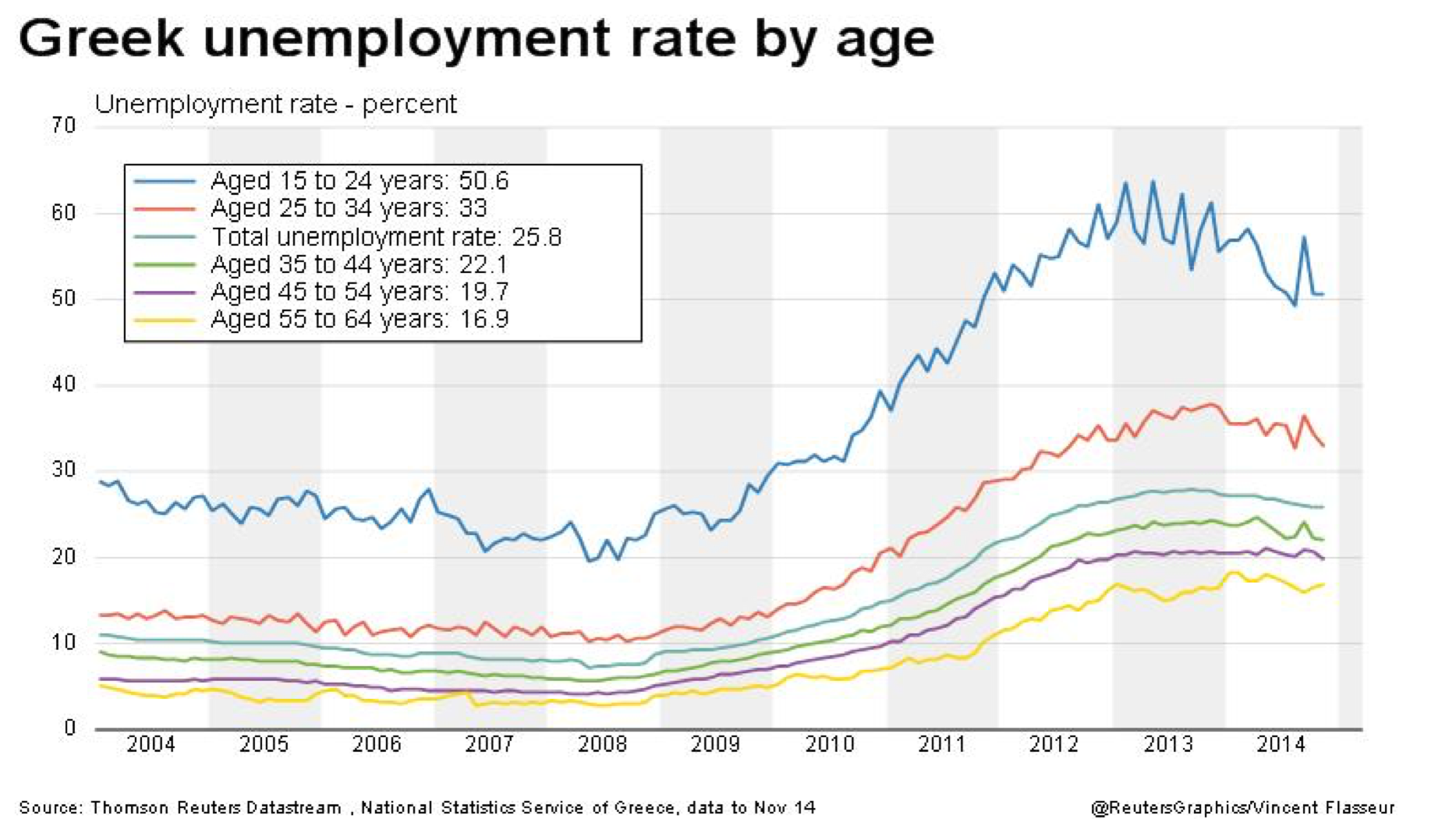
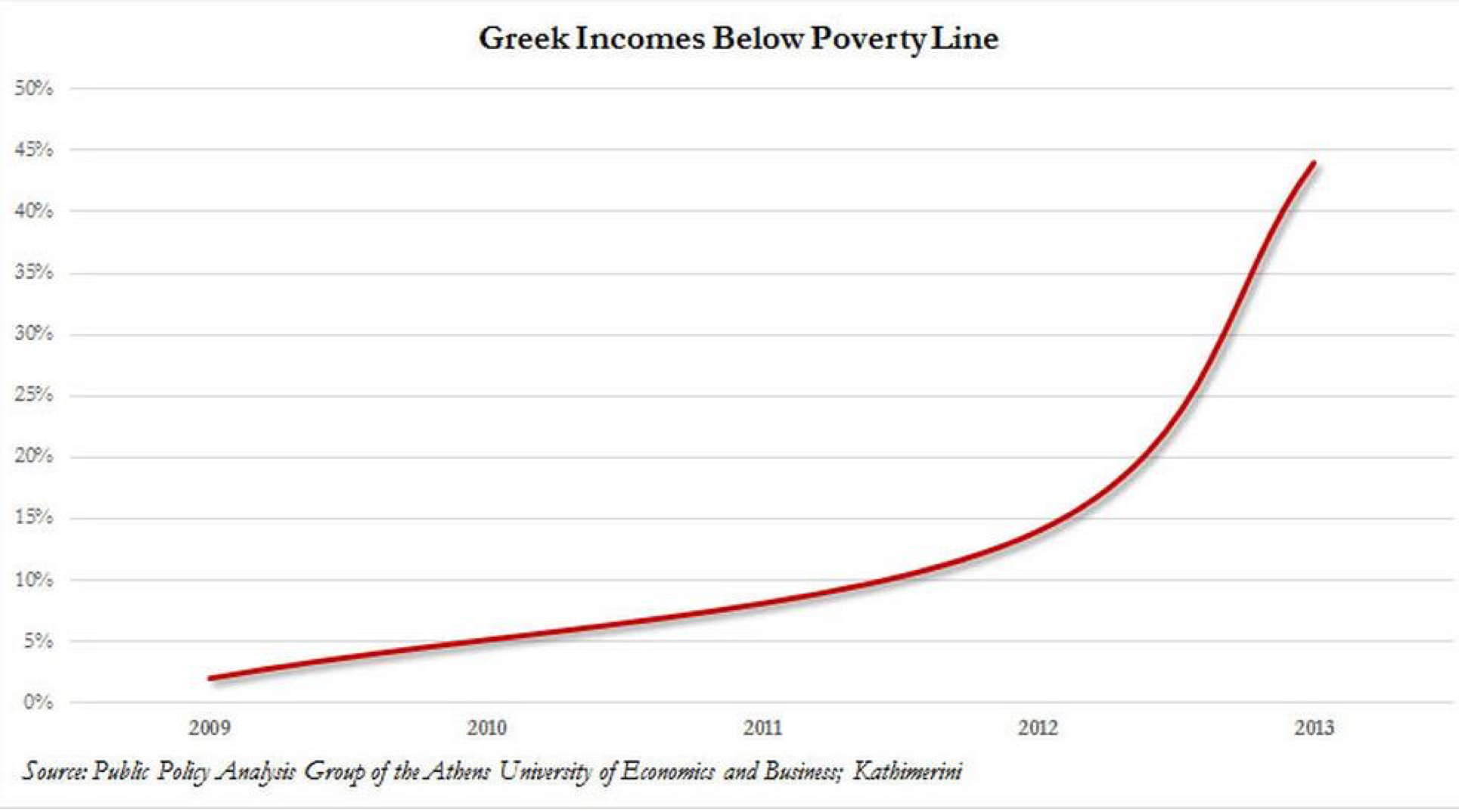
2015: Greek Youth Unemployment and Greek incombes below the poverty line.
9. In July 2015: Greece owes slightly more money than it did at the start of the whole process - c.€325 billion – interest on earlier loans racked up faster than Greece could pay the money back.
10. The reason why Syriza, the radical left coalition, came to power in January 2015, is that Syriza was the only party to say absolutely clearly that such huge austerity was madness. Austerity leads to a shrinking economy; a shrinking economy makes Greece less able to pay back its loans; so Greece is given more loans, with the condition of those loans, more austerity. Tsipiras and Varoufakis argued that the only thing that can get Greece out of this spiral is cancellation of some of its debts. And this is where the Classicists come in…
From January 2015, a new slogan started appearing on Greek flags and posters - seisachtheia. This single word has become the symbol for what Greece is now begging of her European creditors.
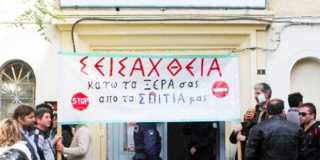
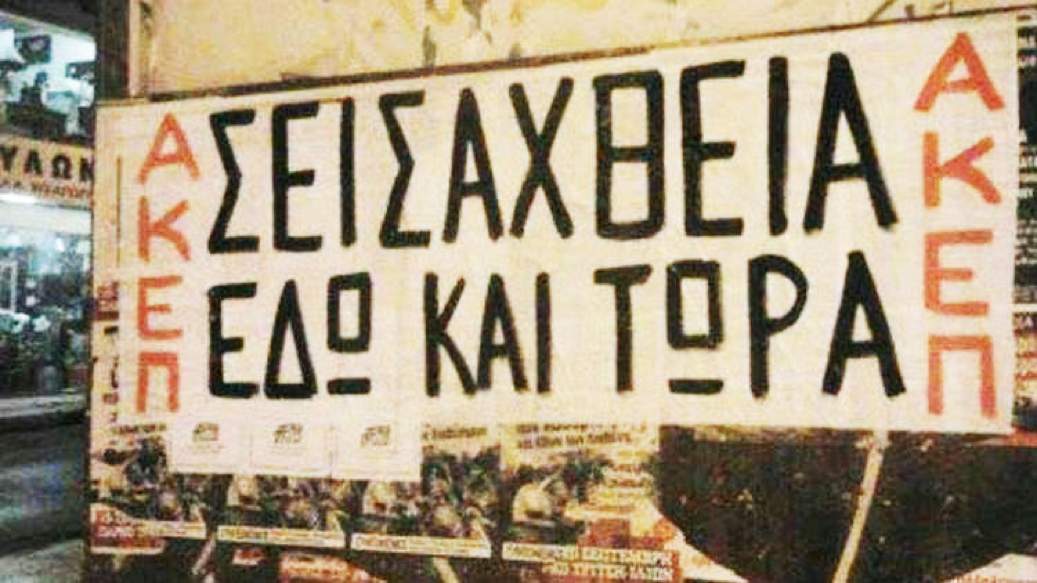
Seisachtheia on banners in 2015
The word seisachtheia is not found in any modern Greek dictionary - it’s not a modern Greek word! Literally it means a “shaking off of burdens”. Only a shaking-off, a cancellation of the country’s debts, can save Greece. Any Classicists reading this - you can download John Dant's brilliant seisachtheia song to the tune of Taylor Swift's 'Shake It Off' here: Seisactheia_Song
This word has a very ancient history:
Around 600 BC, the city of Athens was not much more than a village. Archaic Attica was, on the whole, a desperately poor country, but it was also a country of staggering inequality. At the top of Athenian society was a very small class of extremely wealthy landowners.The rural poor in Attica c. 600 BC are trapped in an exceptionally harsh spiral of debt. If the peasant farmers are unable to pay a sixth of their year’s produce every year to the local landlord, their lands are seized by the rich, and they, and their families, can be sold into slavery.
This was the situation that Solon found when he was appointed by the Athenians as lawgiver c.594 BC, with a specific remit to draw up new laws to bring an end to this debt and poverty.
Solon’s solution was a simple, but radical one. He imposed two simple actions to break the cycle. First, a change to the law on debt; a rich man could still lend money to a poor family, but the borrower from now on cannot be enslaved or sold abroad, for failing to repay his debts. Second, even more extraordinary; a total cancellation of all debts, to allow the peasants of Attica to make a fresh start with what they have. In Solon’s view, the most important part of his seisachtheia was not the return of the slaves, but his cancellation of debts. Solon’s breaking of the cycle of rural poverty, debt, and enslavement set the history of Athens on a whole new track. Solon’s reforms, radical as they were, worked. Athens in 500 BC was a very much richer place than it had been in 594.
The idea of a modern seisachtheia, a cancellation of debts for the contemporary Athenians, probably seemsl ike crazy left wing nonsense. But Syriza'a argument that this is the only realistic way to save Greece from sinking into third-world poverty does deserve some consideration. With both Tsipiras and Varoufakis having resigned and an election coming up what will happen to Greece is anyone's guess…Grexit seems likely and so maybe a Greece independent from the EU could go back to its ancient roots and find a 21st century Solon.
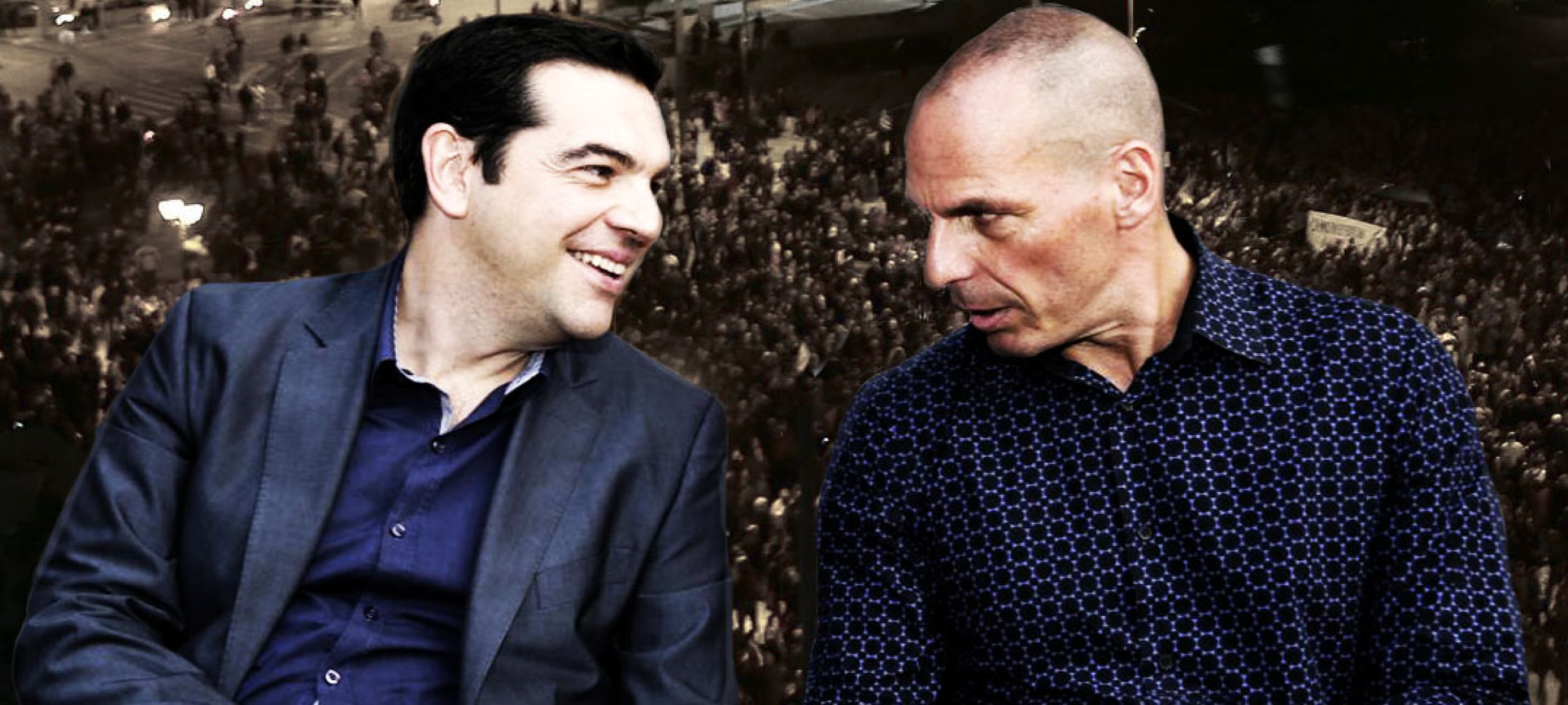
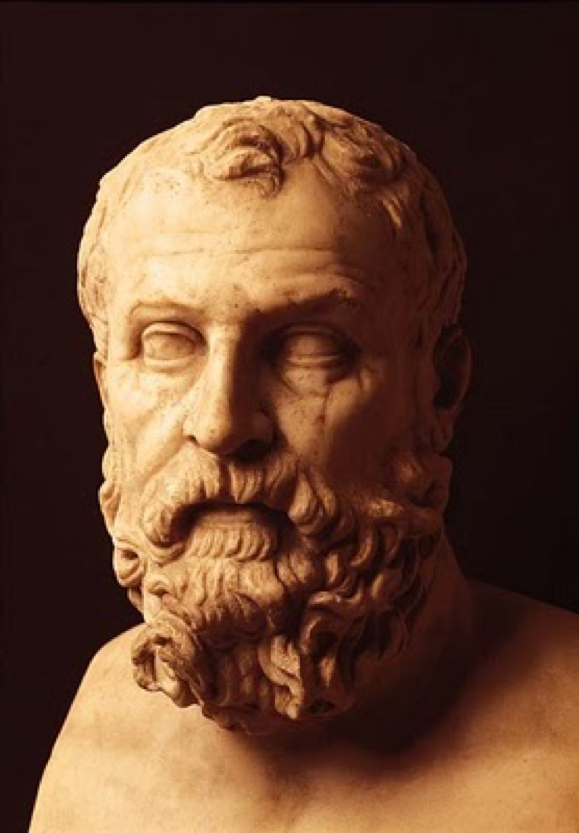
Tsipiras, Varoufakis and Solon
Modern Greek identity still has deep links with its ancient past. The Greeks are immensely proud of their status as the homeland of democracy, philosophy, history, drama etc When Greece is faced, as it has been recently, with a completely new set of challenges, the first instinct is to look back to Classical Athens, and to try to explain their contemporary debt-crisis, and its solution, in ancient Greek terms. And so it is that the word and the concept of the seisachtheia, two and a half thousand years on, suddenly springs back into life as both a symbol and a half-memory, of a possible better future.
When you subscribe to the blog, we will send you an e-mail when there are new updates on the site so you wouldn't miss them.


